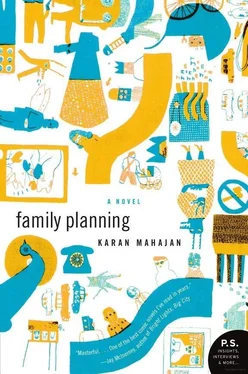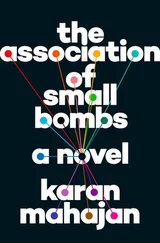“Get the guitars out,” he said.
They did, gathering around Arjun in a semicircle while Ravi used a discarded metal board for percussion. And then, immersed in this personal drama, Arjun turned his back to the cavity and sang. He bellowed with exaggerated passion from the top of the flyover; and the pools of individual thoughts — those chambers in his head that vibrated at odds — seemed to connect through the complex system of his vocal pipes, so that at the moment he hit the highest note, he was either all thought or all vacuum (all vacuum, generally), and the note had the quality of the first leak in a massive dam, terrifying because it promised much worse. But it didn’t matter. He couldn’t care what anyone thought at that moment. He was singing, drawing sound from all the silent orifices of his body the way a heart draws blood, physically evoking the melody of “Living on a Prayer” without a lyric sheet or a sense of the original tune, doing it with nothing, no microphone, no electric guitars, just, as he would like to say years later, Arjun Ahuja Unplugged. It was at that moment that he was finally free of Aarti, a mixture of fear and confidence overtaking his body. It was the way he would feel when he had sex for the first time, somehow forgetting the girl, her name, her face — overcome by a drastic implosion of his own senses as he tried to pretend it was all right, this wasn’t the end, he’d be fine.
He turned his back to his band and sang into the gap. Then he stopped abruptly and let the music clang on without him in an endless outro. He had had a vision. For a brief instant, the instant before he stopped midsentence, he had imagined Mr. Ahuja driving up on the opposite slope of the flyover and letting his Toyota Qualis creak menacingly at the precipice, the lights of the vehicle floodlighting the band as the eight children huddled inside screamed with delight — those children that were his audience, his fans, his dire siblings. The family at its most pleasant: watching from a distance while you sank into yourself, you imploded, you were finally alive.
CHAPTER 13. CROWD SURFING
THE FOUR BOYS LEAPED INTO THE CAR with a newfound sense of camaraderie: Ravi giddyupping his Hyundai Santro with abrupt gear shifts; Anurag in the passenger seat with his elbow dangerously V-ed out of the car; and Deepak persisting in looking dopey and bemused beside Arjun. All of them were under age and illegal; driving age was eighteen. They filed into an endless queue of cars, rolled the windows down, joined the slow pilgrimage to lung cancer.
Arjun was in a grand mood now. He tapped Ravi on the shoulder and said, “Yaar — none of this shorts-wearing business when we do a concert, okay? No one wants to see your hairy legs, understood? We’ll wear black. Since we are dark. Let’s all wear black pants. And maybe we can have our pockets pulled out?” He demonstrated. “See? Looks kind of cool, yeah? Every band has to have a specific fashion style. Bono has those fundoo shades. Metallica has leather. Shania Twain has a belly button.”
“She also has a pussy,” Anurag noted. “That I was—”
“You too?” asked Deepak, solicitously. “She has no self-respect or what.”
Arjun shushed them. “Shut up, you idiots. Are you listening? Pockets should be out. It looks like your legs have ears. Or your hips are shitting.”
“Since when have you started protecting Shania, yaar,” asked Anurag in his slow drawl. “What is she to you — a sister?”
“Good job singing Bryan Adams,” Ravi muttered. “Did you know Shania Twain and your lovely Bryan Adams have the same producer? And that Shania is married to that producer? Shania banged by Mutt Lange.”
Such lascivious recounting of rock history was a strange counterpoint to the utterly sexless action unfolding on the other side of Ring Road as they approached the Moolchand Flyover. All four boys turned to look. Three huge flanks of sari and salwar-kameez-clad women — there must have been at least fifty in all — were milling about excitedly as if at a Saturday bazaar; huge spurts of dust jetted up from around their legs into the awfully dry April evening. The concentration of women was particularly dense under the lone laburnum tree by the road side, its yellow flowers burning brightly overhead in some sort of twilight vigil. A slight parting of their bodies revealed a giant portrait of a young rosy-cheeked man. It was propped against the trunk of the laburnum. The women approached one by one, bent their covered heads with respect, and then carefully strung garlands of marigolds around the frame.
The other ladies sang and beat their chests and shed fat tears on the sidewalk.
Anurag rolled down his window and hooted.
“Don’t do that, duffer,” said Deepak.
“Someone important died or what?” said Anurag.
“You’re an idiot man,” said Deepak. “Even if it’s not important. You hoot when someone dies?”
Arjun shrugged. “That TV star died, yaar. Mohan Bedi, yaar. I think it’s him.”
“Who the hell is Mohan Bedi?” Ravi asked.
The answer came in the form of a neck-breakingly sudden lurch of the car, both Ravi and Anurag thrown head-first (they weren’t wearing seat belts, were too manly for that) into the windscreen while Arjun and Deepak spilled forward into a fetal crouch, the four boys’ heads already aching from what they’d seen: a girl, some girl, hitting the front of the car and literally flying —arms and legs propellered in a blur around her — ten feet from the island on which she’d been standing before she mistakenly stepped out onto the main road. Luckily, as she lay on the ground, her purse and cell phone thud-thud-thudding on the road beyond, no cars sped ahead to finish the job. It was rush hour and miraculously no vehicles were coming her way. Ravi had braked just in time. This had saved him from cracking his skull; ditto Anurag. They got out of the Santro with hands massaging their own necks. The road was hot and bloodless: the girl wasn’t bleeding! She was their age, Arjun noticed as he stepped out of the car. She was lying on her back, her jeans torn, scooterists dodging around her broomlike hair — but she wasn’t bleeding! Everyone, Arjun included, was approaching the girl with the absurd plea of shit shit shit . Hello, dying person, shit shit shit! He didn’t even notice that all the men and women on the other side of the road had rushed over and that he, Arjun, was about to be flattened in a stampede of Jurassic Park proportions. He was jostled out of the way. The girl was surged forward like a crowd-surfer in a concert; a hundred hands off-loaded her onto the sidewalk, two other hands, someone’s charitable hands, laid her purse and cell phone next to her. This was a poor country, but people would astound you again and again with their lack of greed: Arjun and Ravi and Anurag and Deepak, richie-rich, young, so central to the tragedy, had become spectators.
They were standing on Ring Road with five cars honking at them, asking them to move, what are you doing, please move your Santro, do you realize it’s in the middle of the road? In fact, Arjun did , and he was transfixed by the thought that for every second he stood on Ring Road like a fucking stooge, the delay was sending spasms backward all through the city, igniting tempers at traffic lights, so that when a man left work at six o’clock to return to his wife, son, daughter, it would take him an hour longer than usual — an hour in which anything could happen — you could lose someone you loved, vital organs could fail. But the girl wasn’t dead.
Nor was she okay. She was a terrifying in-between: conscious, half-sitting up, palms dusty, still sobbing, she had a puffed-up face. Death or serious injury to the girl would have meant bodily harm for the boys; the crowd, poor and understandably resentful to begin with, would have played out some form of street justice, berating them, lynching them from the parapet of a flyover (or so Arjun imagined). But the women who were cradling the girl in their arms were mothers. They were fans of The Vengeful Daughter-in-Law , the TV show. They felt a mixture of maternal warmth and anger toward the girl: What were you thinking crossing the road like this, are you okay, don’t cry darling, promise you’ll never do anything like this again? They understood that she needed a doctor immediately. They agreed to let the four boys take her to Moolchand Hospital five minutes away.
Читать дальше












